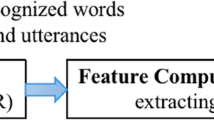Abstract
This article introduces a WeChat mini-program for Smart Oral Evaluation. In this mini-program, we use Tencent Cloud’s Smart Oral Evaluation interface and divide students into different levels, which can accurately return students’ oral English scores and other details in real time. A typical feature of this algorithm is that it supports voice evaluation covering all ages from children to adults, with multiple modes such as words, sentences, paragraphs and free speech, by means of all-round scoring mechanisms including pronunciation accuracy, fluency, and completeness. The similarity of scores by experts is more than 95%, which can be widely used in oral teaching of Chinese and English. The mini-program based on the scoring algorithm of spoken language recognition solves the problem that the current oral English teaching under one instructor’s guidance cannot be adjusted to the needs of every student in one class. After 70 days of experiments, it is proved that the oral English mini-program proposed in this article helps improve the oral English proficiency of each student.
Access this chapter
Tax calculation will be finalised at checkout
Purchases are for personal use only
Similar content being viewed by others
References
Zhang, H.: Analysis of the practice of English teaching in the Central Plains cultural transmission under the background of “One Belt and One Road” construction. New Orient. English, 76 (2019). https://doi.org/10.3969/j.issn.1672-4186.2019.06.065
Tian, H.: Research on the construction and application of college English experimental teaching spoken language corpus. Overseas English (Part 1), 12–14 (2019)
Li, X.D., Zhang, H., Cao, H.H.: Research on oral English teaching model based on electronic learning file in cloud environment. Audio-visual Educ. Res. 82–86 (2013)
Li, J.Y.: Project-based college English teaching practice and reflection with the support of information technology. Teach. Res. 42(3), 63–69 (2019). https://doi.org/10.3969/j.issn.1005-4634.2019.03.012
Duan, H.Q., Li, Y.M., Chen, H.: Research on English teaching practice assisted by WeChat platform. J. Mudanjiang University 27(11), 128–131, 13 (2018). https://doi.org/10.3969/j.issn.1008-8717.2018.11.037
Shen, Z.Y., Wu, Y.W., Liu, J.J.: Design of competition learning platform based on WeChat applet. Comput. Knowl. Technol. 17(21), 87–90 (2021)
Gu, Y.: Multimodal attention network for trauma activity recognition from spoken language and environmental sound. In: IEEE International Conference on Healthcare Informatics, Beijing (2019). https://doi.org/10.1109/ichi.2019.8904713
Li, X.G., Chen, S., Long, X.L.: A sentence-oriented automatic scoring method for oral Chinese-English translation. J. Chinese Inf. Process. 35(7), 54–62 (2021). https://doi.org/10.3969/j.issn.1003-0077.2021.07.007
Ni, H.Q., Liu, X.M.: Design of a scoring system for spoken English pronunciation quality based on virtual reality. J. Sci. Normal Univ. 39(11), 32–36 (2019). https://doi.org/10.3969/j.issn.1007-9831.2019.11.009
Liao, W.: Research on automatic assessment method of question-and-answer pronunciation for English learners. Guilin University of Electronic Technology (2014). https://doi.org/10.7666/d.D533402
Acknowledgements
This research has been supported by Shanghai Dianji University Research Foundation: (Grant No. G2-20-7201-003-05-045), Natural Science Foundation of China (Grant No. 62076160), Natural Science Foundation of Shanghai, China (Grant No. 21ZR1424700).
Author information
Authors and Affiliations
Corresponding author
Editor information
Editors and Affiliations
Rights and permissions
Copyright information
© 2022 Springer Nature Switzerland AG
About this paper
Cite this paper
Xi, K., Nie, Y., Yang, N., Cai, C., Zhang, A. (2022). The WeChat Mini-program for Oral English Evaluation Based on the Smart Listening Algorithm. In: Xu, R., Cai, C., Zhang, LJ. (eds) Cognitive Computing – ICCC 2021. ICCC 2021. Lecture Notes in Computer Science(), vol 12992. Springer, Cham. https://doi.org/10.1007/978-3-030-96419-1_6
Download citation
DOI: https://doi.org/10.1007/978-3-030-96419-1_6
Published:
Publisher Name: Springer, Cham
Print ISBN: 978-3-030-96418-4
Online ISBN: 978-3-030-96419-1
eBook Packages: Computer ScienceComputer Science (R0)




